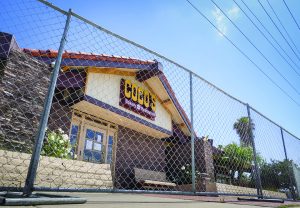New ownership abruptly closes 70 Coco’s and Carrows restaurants, lays off staff
IN THIS ARTICLE
- Latest news Topic
- Elijah Brumback Author
By Elijah Brumback Friday, May 22nd, 2015
It happened almost overnight.
More than 70 Coco’s Bakery Restaurants and Carrows Restaurants were shut down in the span of a few days in early April, including nearly every location in the Tri-Counties.
Food Management Partners, the San Antonio-based firm that bought the chains in late March, closed the doors on many locations so fast, a number of employees’ first notices were after showing up for their shift only to find a note explaining the closure.
FMP issued a previous statement regarding the abrupt closures, saying the stores were underperforming and that difficult decisions were necessary to make the two brands stronger at both the company and franchise levels.
Carrows locations in Santa Barbara, Santa Paula, Ojai, Santa Maria and Oxnard were all shut down. Carrows in Ventura is still open for business. Coco’s in Atascadero, Santa Maria, Ventura and Camarillo were also closed. Locations in Simi Valley and Pismo Beach are still open. The Pismo Beach location is an independently-owned franchise and was unaffected by the mass closures. The Simi Valley location is the only corporate-owned holdout.
A manager at the Simi Valley Coco’s told the Business Times that the restaurant isn’t slated to close, but couldn’t disclose any further information about the other restaurants or their former employees.
According to Nation’s Restaurant News, the industry publication that originally reported the closures, former employees, unit-level team members and even suppliers weren’t notified until they showed up at the restaurants to work shifts or make deliveries.
Former employees who NRN spoke with said nearly all 100 people were laid off at the company’s Carlsbad headquarters and the closures affect an estimated 3,000 workers.
“I felt horrible, and I still do, for the restaurant managers and line cooks who showed up for work and the door was locked. There was no corporate email, no notification,” one anonymous employee told NRN.
“Some of them show up at 4:30 in the morning, and there’s just a sign on the door.”
Phone calls and emails to both FMP’s director of operations and director of marketing were not returned for this report.
Claims that some employees’ company cars were taken and FMP executives told those affected to find another way home, along with claims that FMP offered no severance pay and was ending medical insurance benefits one week from closing dates, couldn’t be confirmed.
In Santa Maria, the company’s actions are even more suspect. Video from local ABC News affiliate KEYT reportedly showed that just a few days after that location closed, the company disposed of sensitive employee information, including Social Security numbers and addresses, in the dumpster behind the building, which prompted identity theft concerns from former employees.
Now, at least one former employee has filed suit against FMP for failing to give fair notice of the layoffs.
Ronald Ross, who worked at both the Torrance and Compton locations, filed the suit April 8, and is pursuing class action status. The basis for the suit is that FMP didn’t comply with the WARN Act.
The federal WARN Act requires employers of 100 or more workers to give 60 days advance written notice of a plant or facility closing that impacts at least 50 full-time employees.
The WARN Act may also apply in cases of mass layoffs when it impacts between 50 and 499 full-time workers at a single site and that number is 33 percent of employees at the site, or if 500 or more full-time workers at a single site are laid off.
According to Nation’s Restaurant News’ Second 100 report, Coco’s had estimated U.S. systemwide sales of $141.5 million for fiscal 2013, a decline of 2 percent from the previous year. The chain had 113 units at the end of the year. Carrows had estimated domestic systemwide sales of $55.2 million, a 5-percent drop from the prior year. The chain ended fiscal 2013 with 58 units.
Both chains originated with the 1948 purchase of The Snack Shop in Corona del Mar by John and Audrey McIntosh. The pair grew the concept and eventually morphed it into Coco’s.
The company was eventually sold, along with Carrows, in 2002 to Catalina Restaurant Group. In 2006, the company was a sold to Japan-based Zensho Co., before FMP bought the company in March.
It’s unclear whether FMP has plans to launch new concepts to replace the Coco’s and Carrows.
Related Articles
 Thursday, June 3rd, 2021
Thursday, June 3rd, 2021
Register now for our Best Places to Work awards reception and panel discussion
 Wednesday, March 3rd, 2021
Wednesday, March 3rd, 2021










